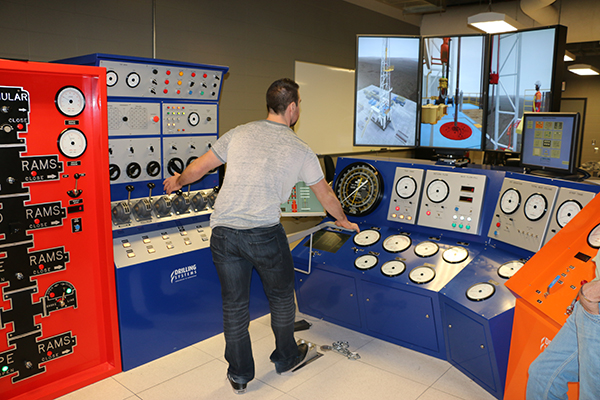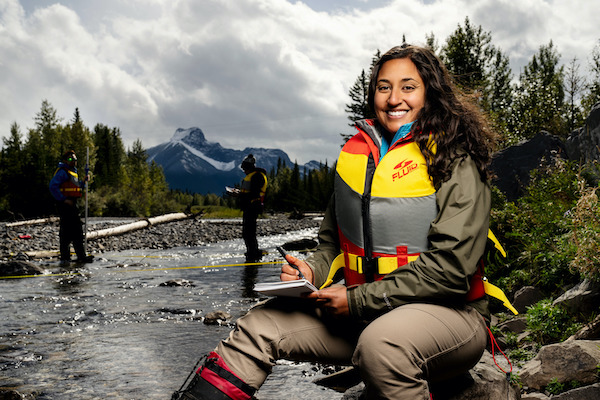On this page:
Overview
Drill into the core of the energy industry with our Petroleum Engineering Technology program. This two-year diploma is crafted for those who want to make a tangible impact in the world of oil and gas in Alberta and beyond.
From uncovering new energy reserves to optimizing field operations, this program offers training in all facets of the upstream petroleum industry.
This sector involves the search for potential underground or underwater oil and gas fields, drilling of exploratory wells, and subsequently drilling and operating the wells that recover and bring the crude oil or raw natural gas to the surface.
In this program, you will:
- gain a proficient understanding of the geophysical and geological principles underlying petroleum and related subsurface resources exploration
- obtain technical expertise in drilling methods, well design and field operations management
- develop competency in applying computer technology for simulation, economic analysis and reserve determination
- discover how to assess the viability of potential drilling sites and manage the lifecycle of a drilling operation
- learn current environmental and safety regulations to ensure compliance in all operations.
Our program emphasizes practical skills. Engage with real-world simulation software and gain hands-on experience in our cutting-edge labs. Learn from seasoned professionals and engineers who bring not only advanced degrees but also real-world experience and industry connections to enrich your educational journey.
As a graduate, you will be prepared for a variety of roles, including petroleum engineering technologists and other careers within the oil and gas industry. You'll confidently enter the workforce, knowing that our diploma is recognized and valued across the industry.
Petroleum engineering technologists tend to be objective, innovative and directive.
You need:
- an aptitude for math, chemistry and physics
- organizational, interpersonal and communication skills
- the ability to work alone or with a team.
You should be comfortable analyzing data. You should like working with tools and instruments at precision tasks. You should enjoy creative problem-solving and be at ease taking charge.
In your final semester, you'll complete a capstone project in partnership with an industry mentor and overseen by an instructor. This project will involve a real-world example of the type of work you'll perform once you enter the workforce.
Graduates are eligible for membership in The Association of Science and Engineering Technology Professionals in Alberta (ASET.)
This program is nationally accredited by the Technology Accreditation Canada (TAC) at the technologist level.
After successfully completing this program, you'll receive a SAIT Petroleum Engineering Technology diploma.
Careers and opportunities
Each year, SAIT conducts a survey between February and April to determine the employment rate, salary and satisfaction of our newest SAIT alumni.
![]() 83% graduate employment rate
83% graduate employment rate
![]() $64,000 average starting salary
$64,000 average starting salary
Find out more about our graduate employment statistics >
Our graduates may work in the following occupations. Some careers require additional experience and education.
Associated National Occupational Classification (NOC) codes: 22101, 73402, 82020, 83100, 84100, 85110.

Career planning support
Unsure which career path is for you? Here are some recommended career planning resources to help you decide your future.
You can also head to Alberta alis for lots of information about careers in Alberta, including quizzes and labour market information to help you narrow down a path.
Finally, you can take our online career finder quiz, which can help narrow your options based on your current skills and interests.
Courses
The Petroleum Engineering Technology diploma requires 60 credits (24 courses) to complete.
The program spans two years, with two semesters each year.
| Course | Credits |
|---|---|
|
This course will introduce engineering chemistry with petroleum applications. Topics include organic chemistry, properties of gases, phase behaviour, thermodynamics, material balance, corrosion, sulfur treating and water treatment. Students will develop an understanding of the chemical principles behind the production processes used in the petroleum industry. Equivalents:
|
1.5 |
|
Professional Communication and Presentation Skills will introduce learners to the professional writing, collaboration and presentation skills needed to be successful in their chosen field. Learners will gain an understanding of the strategies and competencies required for effective communication with an emphasis on developing the interpersonal skills needed to perform as part of a high-functioning team. Coursework will require learners to work in individual and collaborative settings. Equivalents:
|
3 |
|
This applied course on computer functionality focuses on developing skills in the areas of data management, electronic communication and time management, documentation, analysis, and visualization that are required in the petroleum industry. Students will be exposed to petroleum-specific software as well as commonly used office software. In addition to file management techniques and best practices, security considerations such as identifying threats, safeguarding data and intellectual property, and responsible digital citizenship and etiquette are also included. |
1.5 |
|
The basics of drilling technology are explored. This includes types of drilling rigs, drill strings, bits, and fluids (mud) to select the most appropriate, and cost effective technology for a given well. Pre-requisites:
Equivalents:
|
3 |
|
Fundamental aspects of drilling, casing, and hydraulics design for oil and gas wells will be explored, including a detailed examination of modern directional drilling tools, techniques and planning methods. Common industry software applications are used to plan and evaluate directional well paths, casing strings, directional BHA's, and hydraulics programs. Pre-requisites:
Equivalents:
|
3 |
|
Prepare a well program and AFE (Authority for Expenditure) based on geological prognosis, analysis of offset wells and company goals and requirements. You will also plan a well, and evaluate bids for materials and services in order to plan logistics and refine cost estimates. Finally you will monitor the progress of a drilling operation including daily drilling reports, analyzing important operational parameters and controlling costs. Pre-requisites:
Equivalents:
|
3 |
|
This course will develop skill sets in the areas of Canadian oil and gas development and associated Environmental, Health & Safety (EH&S) regulatory compliance scenarios. There will be an in-depth review of Occupational Health and Safety legislation and topics applicable to the petroleum industry. The student will be able to identify, assess, and control hazards common to the oil and gas industry. The course also investigates the role of hydrocarbons in society and the possible future of renewable and non-renewable fuels. The course reviews the energy asset life cycles and the requirements of each key player in each phase of the life cycle (exploration, drilling, development, remediation, and reclamation). The course will also review: current regulations, environmental compliance processes impacts associated with each stage, and potential mitigation methods to reduce and /or minimize the impacts. Equivalents:
|
3 |
|
This course is an introduction to physical geology, which is the scientific study of Earth processes and their products through time. Topics include rocks and minerals, geologic time, plate tectonics, structural geology, depositional environments, and the geology of Canada. Students identify rocks and minerals and prepare various types of geologic maps and cross-sections. Equivalents:
|
3 |
|
This course provides an introduction to basic petroleum geology. Students will explore petroleum-related concepts and exploration procedures from a geological context, including origin and migration of hydrocarbons, reservoir, source and cap rocks, trapping mechanisms, formation evaluation (well log analysis), geologic contour mapping and cross-sections. The petroleum geology of Canada, with emphasis on the Western Canadian Sedimentary Basin, will be discussed. Pre-requisites:
Equivalents:
|
1.5 |
|
This course focuses on advanced concepts in petroleum geology leading to a better understanding of the origin, distribution, and properties of petroleum and petroleum-bearing rocks. Topics include advanced sedimentology and stratigraphy, sedimentary basin and petroleum system analysis, unconventional petroleum resources, and the application of petroleum geology in the three phases of industry activity, namely exploration, development, and production. Pre-requisites:
Equivalents:
|
1.5 |
|
This course enables the student to apply the basic knowledge of algebra and introductory calculus to resolve applied scientific and technological problems. Applications include linear motion, areas under curves, and volumes of revolution. Equivalents:
|
3 |
|
This course enables the student to apply advanced algebra, integral and differential calculus methodologies to scientific and technological applications. Topics include trigonometric and transcendental calculus, methods of integration, specifically integration by parts, by trigonometric substitution, and by use of tables. Applications include linear motion, areas under curves, volumes of revolution, centroids, moments of inertia, and program-relevant applications. Pre-requisites:
Equivalents:
|
3 |
|
A study of fluid mechanics that supports Petroleum Engineering topics including fluid properties, fluid statics, fluid flow, losses and pumps with applications in the petroleum industry. |
3 |
|
This course provides a study of statics and mechanics of materials applicable to petroleum engineering as well as engineering material properties and behavior for petroleum application. |
1.5 |
|
Under the supervision of an industry advisor, research and analyze a technical problem; students will complete and present a final report. Pre-requisites:
|
1.5 |
|
Assess and evaluate petroleum projects from an economic, corporate, environmental and societal point of view. Also, to apply the key concepts of project management to the successful implementation and completion of such projects. Pre-requisites:
Equivalents:
|
1.5 |
|
A solid foundation of the oil and gas industry is provided including perspectives in exploration, drilling, completions, production, facilities, pipelines, and product processing. Students will become aware of the business of oil and gas relating to land and hydrocarbon rights, regulations, ethical responsibilities, and employment opportunities. |
3 |
|
Production Facilities offers detailed insight into the gathering, field handling, and processing of oil and gas. Areas of study include conventional oil and gas as well as oil sands and liquid natural gas operations. Students will gain an understanding of the latest codes, specifications, and regulations as well as operate production equipment at SAIT lab facilities. Pre-requisites:
Equivalents:
|
1.5 |
|
Analyze and evaluate cased hole wellbore configurations, flowing bottomhole pressure data, inflow performance, and artificial lift systems to maintain or re-determine the predicted production profile of an oil and/or gas well. Pre-requisites:
|
3 |
|
Analyze, evaluate, and apply basic concepts for the completion of conventional and unconventional oil and gas wells. Students will gain knowledge of the industry recommended practices, regulations, planning, and procedures involved in well completions and the stimulation or remediation of fluid inflow for optimal production. Pre-requisites:
Equivalents:
|
3 |
|
This course covers fundamentals of reservoir engineering technology including: rock and fluid properties; fundamentals of thermodynamics and phase behavior for reservoir engineering, calculations of oil and gas resources using volumetrics, planimetrics and material balance methods, Ideal and real gas laws, sweet and sour gases, gas mixtures; calculation of oil and gas PVT parameters; Darcy's law, permeability and incompressible fluid flow. Pre-requisites:
Equivalents:
|
3 |
|
This course builds on fundamental concepts of reservoir engineering technology and includes: gas processing, calculation of recoverable and marketable gas, decline curve analysis, bottom hole pressures, full oil material balance, drive mechanisms, waterflood analysis, relative permeabilities, and fluid flow into a damaged/stimulated wellbore. Pre-requisites:
Equivalents:
|
3 |
|
This course focuses on advanced reservoir topics including Gas Well Testing, Pressure Transient Analysis, Oil Well Testing, Drawdown and Buildup Analysis, Horizontal Wellbores, Heavy Oil Recovery Methods, Thermodynamics of Thermal Recovery, Steam Assisted Gravity Drainage (SAGD), Steam Flooding, Cyclic Steam Stimulation (CSS). Pre-requisites:
Equivalents:
|
3 |
|
STAT 245 is an introductory course in data analysis for students in engineering technology programs. Students apply techniques to organize, display, analyze and report data. Outcomes include methods of descriptive and inferential statistics. Students will be exposed to software-based methods in laboratory sessions using industry-grade data. Some advanced topics of analysis are selectable toward the end of the course. |
3 |
Progression
You must attain a PGPA and/or a CGPA of 2.0 or better each semester and pass the prerequisite courses to progress through the program.
To qualify for graduation, you must pass all courses, attain a CGPA of 2.0 or better and complete course requirements within the prescribed timelines.
Review our grading and progression procedure >

Explore your options!
Some courses in this program are available through Open Studies. You can complete courses via Open Studies to get a head start on your education, reduce your course load once accepted into a credentialed program, or determine which career path best suits you before you fully commit.
You may also take courses for general interest or personal and professional development.
Admission requirements
Applicants educated in Canada
Applicants must demonstrate English language proficiency and completion of the following courses or equivalents:
- at least 60% in Math 30-1 or 75% in Math 30-2, and
- at least 60% in English Language Arts 30-1 or 75% in English Language Arts 30-2, and
- at least 60% in Chemistry 30, and
- at least 60% in Physics 20.
SAIT accepts high school course equivalents for admission for applicants educated outside Alberta.
All applicants who were educated outside of Canada must demonstrate English language proficiency and provide proof they meet the program admission requirements outlined above with an international document assessment. Find accepted educational documents and assessment options.
SAIT may also accept courses completed at certain international post-secondary institutions.

Academic Upgrading
Missing an admission requirement for this program? Upgrade your prior education to help you receive admission into one of SAIT's career programs.

English language proficiency
All applicants must demonstrate English language proficiency prior to admission, including students educated in Canada.
Transfer agreements
At SAIT, we have created transfer agreements with partner institutions to allow you to earn course credits toward your SAIT program based on your previously completed credentials.
Transfer Alberta search tool
Use the Transfer Alberta search tool to see all transfer agreements between Alberta post-secondary institutions (including those with the University of Calgary, Mount Royal University and Bow Valley College.)
Search transfer agreements in Alberta
There are no formal transfer agreements currently in place for this program.
Transfer options for graduates
When you have completed this program, you may continue your education at a partner post-secondary institution. These transfer agreements include partnerships within and/or outside of Canada.
Credits this program transfers to
- Available credits:
- 42
Upon successful completion of this program, you'll be eligible to apply for admission into the University of Wyoming's Bachelor of Science in Petroleum Engineering program.
If all admission requirements are met, you will receive up to 42 transfer credits toward the degree.
SAIT graduates are also eligible to apply for financial assistance from the Eresman Family Engineering Endowment through UW’s Center for Student Services.
Available intakes
Fall 2025
Start dates:
- Domestic students: Waitlisted
-
-
Application deadline: June 30, 2025
-
- International students: Open
-
-
Application deadline: May 30, 2025
-
Costs
2025/26 tuition and fees
The following estimated costs are effective as of July 1, 2025.
The estimated total cost of tuition and fees is based on the suggested schedule of study. Following a modified schedule will impact the fees you pay per semester and may alter final costs.
Domestic students
The program total is based on the estimated amount you will pay if you enter this program during the 2025/26 academic year. The program total amount listed on your letter of admission may appear higher. This amount is your maximum tuition guarantee for the program. SAIT will not exceed this maximum, regardless of changes in tuition and fees between academic years.
Books and supplies are approximately $1,500 per full-time year.
This is a bring-your-own-device program with a standard computer hardware and software requirement. See the specific requirements on our computers and laptops page.
Find your booklist on the SAIT Bookstore's website. The booklist will be available closer to the program start date. Can't find your program or course? The bookstore didn't receive a textbook list. Contact your program directly to determine if they're still refining course details or if you're in luck; no textbook purchase is required this term.
Required equipment/tools
You'll require a scientific calculator capable of performing linear regression.
Required personal protective equipment (PPE)
The industry-approved PPE you'll need will be discussed during your first few days of classes.

Financial aid
Paying for your education may feel overwhelming, but we have resources and programs that can help, including information about payment options, student loans, grants and scholarships.
Application process
Ready to apply?
Follow our step-by-step guide to submitting a successful application.
Communication during admission
Email is the primary source of communication during the selection process. Ensure your personal email account is managed appropriately to receive our emails, files and communications. We recommend you add the macphail.students@sait.ca domain to your safe senders' list or you risk missing critical email messages.

Begin your application
Apply now using the online application portal.
Ensure you have a valid Visa or Mastercard to pay the non-refundable application fee of $120 for domestic applicants or $175 for international applicants.
Information sessions
Prepare for a strong start in your chosen program or get the details you need to decide your future path.
Our expert staff and faculty are ready to answer your questions and provide information about the following:
- What sets SAIT apart
- An introduction to the program and area of study
- Admission requirements
- Future career paths
- Information on the earning potential and graduate employment rates.
Contact us
MacPhail School of Energy
-
Phone - 403.284.8451
International Student Advising
-
Phone - 403.284.8852
-
Email - international@sait.ca
Subscribe for updates
Your journey starts here! Sign up to get important updates on:
- Energy and environment programs
- Application information
- Relevant news and events

Oki, Âba wathtech, Danit'ada, Tawnshi, Hello.
SAIT is located on the traditional territories of the Niitsitapi (Blackfoot) and the people of Treaty 7 which includes the Siksika, the Piikani, the Kainai, the Tsuut’ina and the Îyârhe Nakoda of Bearspaw, Chiniki and Goodstoney.
We are situated in an area the Blackfoot tribes traditionally called Moh’kinsstis, where the Bow River meets the Elbow River. We now call it the city of Calgary, which is also home to the Métis Nation of Alberta.




